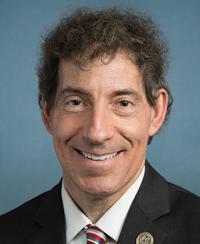It turns out there is something Republicans and Democrats can agree on about religious liberty in the current lame-duck session of Congress.
On Monday, Dec. 7, the House of Representatives passed on a 386-3 bipartisan vote House Resolution 512, calling for the global repeal of blasphemy, heresy and apostasy laws. Rep. Jamie Raskin (D-Md.) was a lead sponsor of the legislation in the House and was joined by 42 others, including 14 Republicans. A corresponding bill in the Senate is sponsored by James Lankford (R-Okla.) and eight other Republicans.

Rep. Jamie Raskin
“I’m gratified to see our bipartisan resolution pass in the House,” Raskin said. “Authoritarian regimes use arbitrary blasphemy, heresy and apostasy laws to imprison, torture and kill religious minorities. Today the House called for an end to these egregious human rights violations worldwide. I’m gratified by this crucial victory, but our work continues to ensure that no one is imprisoned for his or her religious beliefs across the globe.”
Although a resolution has no force of law and the U.S. Congress has no authority over other world governments, this sense of Congress, if also passed by the Senate, will inform U.S. foreign policy and global advocacy.
The resolution calls for the immediate release of religious prisoners of conscience worldwide. More than 80 countries use blasphemy laws to persecute and imprison religious minorities and dissenters, Raskin said. The United States Commission on International Religious Freedom reports that more than one-third of the world’s countries maintain the use of blasphemy laws, with penalties including fines, imprisonment, forced labor and the death penalty.
In addition to the bipartisan support in the House, the resolution — which was introduced in 2019 — received support from a diverse coalition of religious and nontheistic organizations. Among those was Baptist Joint Committee for Religious Liberty.
Jennifer Hawks, BJC associate general counsel, said blasphemy and apostasy laws “strike at the most fundamental human right: the ability for each individual to decide whether to be religious and, if so, what that religion will be.”
This runs counter to Article 18 of the United Nations Declaration of Human Rights, which says all people are entitled to religious freedom, including the ability to change religion or belief.
“Because of our Constitution’s First Amendment, blasphemy and apostasy laws are unenforceable in the United States, but much work is still needed around the world,” Hawks explained.
She emphasized that Americans still can be directly affected by these laws, even though they aren’t enforceable in America. For example, in July 2020, American citizen Tahir Naseem was assassinated when, according to the U.S. State Department, he was lured from his home in Illinois to Pakistan by people who then entrapped him with Pakistan’s blasphemy laws. While Naseem was in a Pakistani courtroom for a bail hearing related to his 2018 charges of blasphemy, he was gunned down by a teenage vigilante. That vigilante now is being celebrated as a local hero.
“Fear of government reprisals or vigilante violence exists in many countries.”
“While most Americans may give little thought to blasphemy and apostasy laws, our global neighbors and Americans who travel or work abroad are not so fortunate,” Hawks said. “Fear of government reprisals or vigilante violence exists in many countries for expressing or being accused of expressing a religious opinion that differs from the ruling class.”
These laws do not just persecute Christians, she added. “Pakistan, one of the countries where blasphemy is a capital offense, has charged more Muslims with blasphemy than any other religious group.”
The Senate version of this bill was referred to the Foreign Relations Committee nearly one year ago. The current session of Congress will conclude prior to the 117th session beginning on Jan. 3, 2021.


